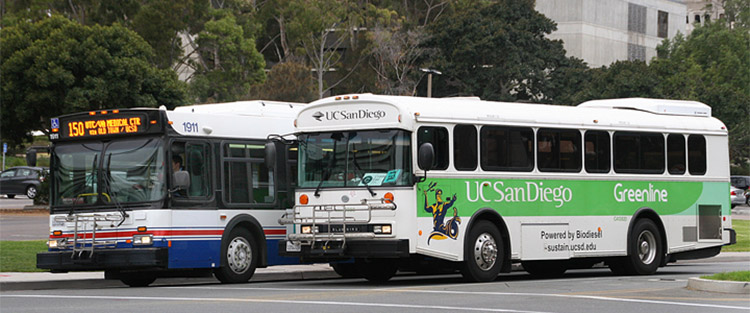
By:
- Laura Margoni
Published Date
By:
- Laura Margoni
Share This:

Students Vote on Fee Referendum to Implement New Transit Pass
Undergraduate and graduate students at UC San Diego are voting on a fee referendum this week that will determine whether a new transit pass program will begin this fall. The referendum was initiated by students in response to Transportation Services’ need to make changes to address ongoing budget shortfalls. The department is entirely self-supporting and receives no state funds or revenue from student fees for the essential services it provides to the campus community.
“Associated Students spearheaded the effort to inform students about the challenges facing the department,” said Robert Holden, director of Auxiliary Business Services, which oversees Transportation Services. “They conducted student surveys and other outreach to determine if students would be willing to pay a fee to support transportation. We have worked with them to provide data and determine what services we might be able to maintain if their referendum passes.”
If the referendum does pass, students will be charged a $49.96 fee each quarter that will pay for a new regional transit pass program called the Universal Pass (UPass) program. None of the fees would be used to pay for campus programs, staff or services. The new UPass would expand transit access for students, offering unlimited ridership during the fall, winter and spring quarters on all mass transit bus and trolley/light rail routes in the San Diego region provided by the San Diego Metropolitan Transit System (MTS) and the North County Transit District (NCTD), excluding MTS rural and premium express routes. Students negotiated directly with MTS and NCTD to determine the fees and parameters of the program.
“With UPass, students would have access to more routes and options than what currently exists in the MTS Bus Zone program,” said Holden. “They could take advantage of more housing options and gain increased access to the greater San Diego community.”
As the UPass program would duplicate services currently provided through the MTS Bus Zone program, the Bus Zone would be phased out, saving Transportation Services approximately $3 million annually. Students would also use Compass Cards rather than bus stickers – “smart” cards that can be loaded with a transit pass for bus, trolley, coaster and sprinter service, enabling users to just tap and ride.
Other changes that will take place if the referendum passes include:
- Transportation Services will continue to provide City Shuttle Service for students.
- Parking rates will be de-coupled from subsidized bus programs. Revenue generated by parking fees would no longer be used to subsidize these unfunded programs. Fees would instead be used to address the $10.5 million in deferred maintenance on parking structures and lots as well as invest in new technology and programs that will make it easier to find parking on campus.
If the referendum does not pass, there will still be a need for Transportation Services to make significant changes.
“We have been working very hard to reduce costs and improve processes as well as develop new revenue sources such as our bus advertising program,” said Holden. “We are still deficit spending to cover the cost of unsubsidized programs like the MTS Bus Zone, however, and this practice is not sustainable.”
Possible changes that may occur should the student fee referendum fail:
- All MTS Bus Zone riders would transition to using regular MTS bus passes that would be purchased by the individual user.
- MTS bus passes would be sold to users by MTS, MTS outlets or online. This would lead to reductions in Transportation Services’ staff who currently handle these transactions.
- Elimination of subsidies for bus passes as there are currently no funding sources to sustain these subsidies.
- Evaluation of UC San Diego Shuttle services and elimination or reduction of routes that duplicate existing MTS routes. These duplicate routes currently cost $1.7 million annually to maintain.
- Evaluation of all other subsidized programs.
Whether the referendum passes or fails, parking rates on campus will still need to be evaluated and addressed.
“Parking rates have not been increased since 2006,” said Holden. “With our current program subsidies and the need to address deferred maintenance, we must review our rates and look at making adjustments.”
Transportation Services is developing a model and a test for proximity parking on campus. Lots and spaces close to high use areas would become classified as “Gold,” “Silver” or “Standard” according to highest demand and rates would be adjusted accordingly.
“We have a strong demand for reserved spaces by customers who don’t qualify for the spaces,” said Holden. “By providing proximity parking, premium spaces can become available to anyone who is willing to pay for them. This could be a good way to meet our customers’ needs while generating revenue for the department.”
Once the outcome of the referendum is decided tomorrow evening, Transportation Services will begin moving forward with necessary changes. Customers can offer feedback or ask questions via email at telltps@ucsd.edu. For more details on the possible changes ahead, visit Move UC San Diego.
Share This:
You May Also Like
Stay in the Know
Keep up with all the latest from UC San Diego. Subscribe to the newsletter today.


